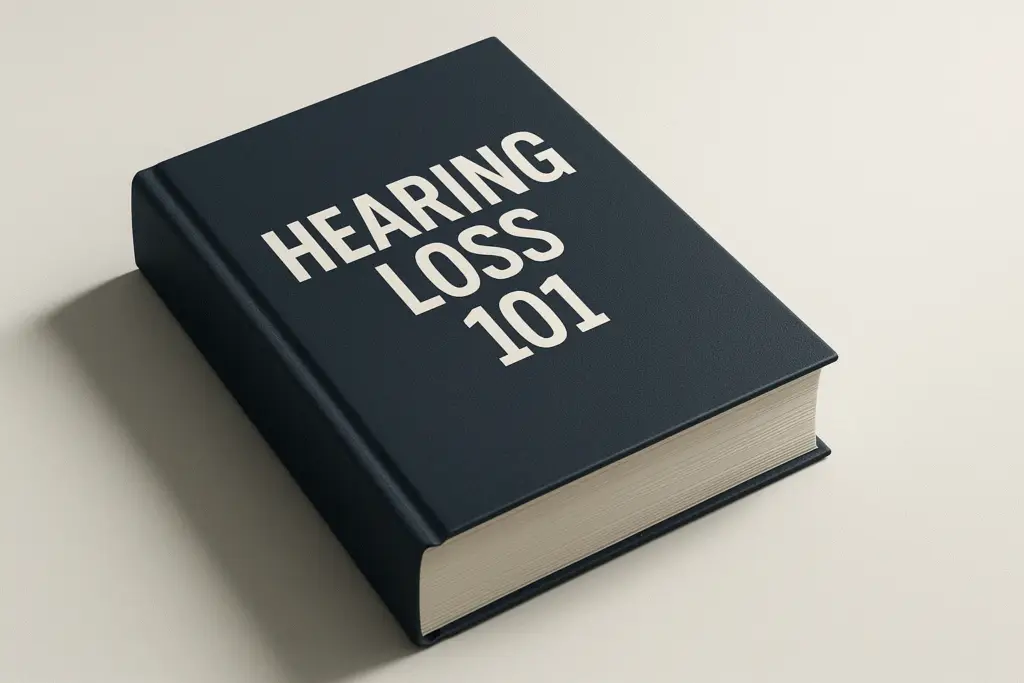Hearing Loss 101
Understanding Hearing Loss
Understanding hearing loss: causes, types, symptoms, and what to do next isn’t just for those with hearing trouble. Hearing Loss 101 is for anyone who wants to stay connected to the people and moments that matter most.
Hearing loss affects millions of people—especially older adults. Yet, many wait years before seeking help. The good news? With early detection and the right care, you can stay engaged in life. Hearing Loss 101 offers crucial insights for this.
Let’s explore the types of hearing loss, what causes it, how to spot the signs, and what you can do about it in this Hearing Loss 101 guide.
Types of Hearing Loss
Knowing what type of hearing loss you have is essential for choosing the right treatment. There are three main types: conductive, where sound is blocked from reaching the inner ear; sensorineural, caused by inner ear or nerve damage; and mixed, a combination of both. Treatments may include medical care, surgery, or prescription hearing aids depending on the type.
Conductive Hearing Loss
This happens when something blocks sound from reaching the inner ear. Think of earwax buildup, fluid in the middle ear, or even a small bone issue. It can often be treated medically or surgically.
Sensorineural Hearing Loss
This is the most common type, especially in older adults. It’s usually caused by damage to the inner ear or the nerve that carries sound to the brain. Prescription hearing aids are often the most effective treatment.
Mixed Hearing Loss
As the name suggests, this is a combination of both conductive and sensorineural hearing loss. You may need a mix of medical care and prescription hearing aids.
Causes of Hearing Loss
Hearing loss can develop gradually or happen suddenly, depending on the cause. Common reasons include age-related changes in the inner ear, often making it harder to hear higher frequencies; loud noise exposure, which can damage hearing over time; and genetic factors, which may not appear until later in life. Some medications, known as ototoxic drugs, can also affect hearing—so it’s important to discuss potential side effects with your doctor.
Age-Related Hearing Loss (Presbycusis)
This is one of the most common causes. As we age, the delicate hair cells in the inner ear wear down. That makes it harder to hear high-pitched sounds or follow conversations, especially in noisy places. Understanding this is fundamental to Hearing Loss 101.
Noise-Induced Hearing Loss
Loud sounds—like concerts, power tools, or even lawn mowers—can damage your ears. If you’ve ever had ringing ears after a loud event, your ears were telling you something.
Genetics and Hearing Loss
Sometimes, hearing loss runs in the family. At first, you might not notice it, but later in life, your genes begin to play a part.
Ototoxic Medications
Certain medications can harm your hearing over time. These include some antibiotics, chemotherapy drugs, and even high doses of aspirin. Additionally, always ask your doctor if a medication may affect your hearing.
Is It Time to Get Checked?
Hearing loss often starts subtly—maybe the TV seems quieter, or you’re asking people to repeat themselves more often. Friends and family are usually the first to notice. Other early signs include struggling in noisy environments, thinking others are mumbling, or missing doorbells and phone calls. A hearing evaluation is quick, comfortable, and non-invasive. It involves a brief discussion about your symptoms, followed by a simple test to measure what you can and can’t hear. These results help determine the best next step.
Early Signs You Might Be Losing Your Hearing
You may not notice it at first. Maybe you’re turning up the TV louder than usual. Or asking others to repeat themselves. Often, friends and family notice the changes before you do. This early detection is key in Hearing Loss 101.
Other signs include:
- Struggling to hear in noisy places
- Thinking people are mumbling
- Missing phone calls or doorbells
What to Expect During a Hearing Evaluation
A hearing check is quick, easy, and pain-free. It starts with a few questions about your hearing history and symptoms. Then, you’ll sit in a quiet room and listen to different tones and words. This helps measure what you can and can’t hear. The results will guide your next steps.
Why You Shouldn’t Wait
Delaying treatment for hearing loss can have serious consequences. Research shows it’s linked to cognitive decline, as the brain strains to process sound, leaving less capacity for memory and focus. It can also strain relationships, leading to isolation or depression. Addressing hearing loss early can help protect both your mental sharpness and emotional well-being.
Hearing Loss and Cognitive Decline
Recent studies have shown a strong link between hearing loss and memory problems. When your brain works harder to hear, it has less energy for other tasks—like thinking clearly or remembering names.
Impact on Relationships and Mental Health
Hearing loss can make everyday conversations frustrating. Over time, this can lead to social withdrawal, loneliness, or even depression. That’s why it’s so important to take action. Hearing Loss 101 will guide you on the steps to take.
What to Do Next: You Have Options
If you suspect hearing loss, don’t wait, understanding difficulties hearing: the causes, symptoms, types, and what to do next is invaluable. Start by scheduling a hearing check. The sooner you know what’s going on, the sooner you can take control.
Prescription hearing aids today are smaller, smarter, and more comfortable than ever before. Many can even connect to your phone or TV.
For more information on hearing loss go to www.hearingloss.org.
At Northumberland Hearing Center, we’re here to help you every step of the way—with care that’s personal, professional, and focused on your comfort.



